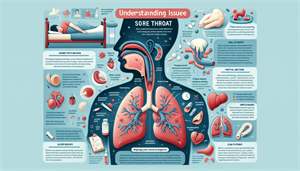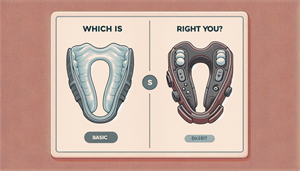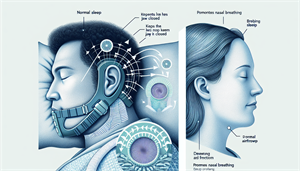
About Sore Throat from Snoring: What You Need to Know
Snoring – an annoyance for some, a nightly ordeal for others. But did you know that snoring can also lead to a sore throat from snoring?
The connection between snoring and sore throats is often overlooked, yet understanding this link is crucial for achieving better sleep and overall health. In this article, we’ll delve into the causes of snoring, how it can result in sore throat from snoring, and the practical solutions and medical interventions available to reduce snoring and improve your well-being.
Key Takeaways
-
Snoring can cause sore throats due to dryness, irritation and enlargement of throat tissues.
-
Practical solutions such as lifestyle changes, sleep position adjustments, humidifiers/ nasal decongestants and anti-snoring devices like mouthpieces can help reduce snoring & prevent sore throats.
-
Healthcare professionals should be consulted if symptoms persist.
-
Sleep studies may be necessary for accurate diagnosis & tailored treatment plans.
The Connection Between Snoring and Sore Throats
Snoring occurs when air flows through relaxed tissues in the upper airway, causing the tissues to vibrate and create the harsh sound we associate with snoring. This vibration can lead to sore throats due to dryness and irritation of the oral cavity and throat, as well as enlargement of throat tissues caused by vibrations of throat muscles.
In fact, serious sleep disorders like obstructive sleep apnea, allergies, weight gain, or advancing age may contribute to snoring. Appreciating the link between snoring and sore throats allows us to progress towards uncovering efficient solutions and enhancing our sleep quality.
In addition to causing sore throats, snoring may also result in various health problems, such as Type II diabetes and hypertension, due to oxygen deprivation. Furthermore, being overweight can contribute to the development of obstructive sleep apnea-related symptoms, including snoring-related sore throats. Tackling the root causes of snoring can help to ease sore throats and augment overall health.
Dry Mouth and Throat Irritation
Dry mouth is a condition wherein the salivary glands in the mouth do not generate sufficient saliva, resulting in a sensation of dryness in the mouth and throat. Snoring, especially through the mouth, can exacerbate this dryness, leading to irritation and discomfort.
The repercussions of dry mouth on sore throats can include:
Persistent sore throat Difficulty swallowing Hoarseness
Dry nasal passages Other indications may include halitosis, cracked lips, and a dry, rough tongue.
To address dry mouth and throat irritation, treatments may include: Consuming ample fluids Abstaining from alcohol and caffeine Utilizing a humidifier Utilizing over-the-counter saliva substitutes In more severe cases, a physician may prescribe medications to increase saliva production. Focusing on remedying dry mouth and throat irritation can notably diminish the discomfort and soreness instigated by snoring.
Swelling of Throat Tissues
Severe snoring can lead to swelling of throat tissues due to the vibrations of the soft tissues in the throat. This swelling can result in sore throats, difficulty breathing, and other health issues. Recognizing and tackling the factors promoting severe snoring is vital to shrink swelling of the throat tissues and avoid sore throats.
Lifestyle modifications, such as abstaining from alcohol and smoking, sleeping on one’s side, and utilizing a humidifier, can help to reduce swelling of throat tissues. Additionally, medical interventions such as Continuous Positive Airway Pressure (CPAP) therapy, oral appliances, and surgical options may be suggested to provide more comprehensive solutions for snoring and sore throats.
Obstructive Sleep Apnea: A Major Culprit in Snoring-Related Sore Throats
Obstructive Sleep Apnea (OSA) is a sleep disorder characterized by repetitive episodes of complete or partial upper airway obstruction during sleep. This can lead to snoring and result in sore throats, as well as other health issues. OSA is a major culprit in snoring-related sore throats, and it is essential to seek medical attention for accurate diagnosis and tailored treatment plans. Healthcare professionals may recommend lifestyle changes, CPAP therapy, oral appliances, or surgical options to address OSA and alleviate snoring-related sore throats.


